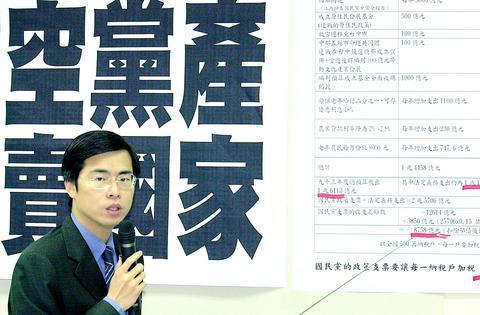President Chen Shui-bian (陳水扁) yesterday vowed to ask the Chinese Nationalist Party (KMT) to return at least NT$190 billion after he wins a second term, saying that money stolen by the party belongs to all the people of Taiwan.
"According to reports from the Control Yuan, over the past three years the KMT has sold assets, which are worth over NT$190 billion -- NT$170 billion by selling stocks and NT$20 billion through real-estate sales," he said.
"The reports tell us that the KMT is the wealthiest political party in the world and it has the richest presidential candidate," Chen said. "We must ask the party why it has so many assets and where that money has gone."

PHOTO: GEORGE TSORNG, TAIPEI TIMES
"This is a mission to ask for justice for all the people of Taiwan," he said.
At a rally in Hualien County yesterday, Chen defended moves by the Democratic Progressive Party (DPP) to ask the KMT to return its assets stolen from the government during its decades in power.
He accused the KMT of deceiving the people during the presidential election campaign four years ago when it said it would deal with the issue. He said four years have passed without the KMT doing anything about its stolen assets and with the party using its power in the legislature to block efforts to seek justice.
This gave the KMT time to sell off the property, Chen said. The party has sold NT$190 billion of assets over the past four years -- enough to build two Su-Hua Highways; to allow a freeze in public health insurance premiums for 31 years; to enable no increase in university education fees for 62 years or to enable children of lower income households to receive education at no charge, Chen said.
"During the presidential election four years ago, they promised to return [the assets]," Chen said, "but they have returned nothing."
"They have done nothing, yet they hinder other people from doing anything about it. Meanwhile, they sell party assets and put the money into private pockets," Chen said.
Chen said the DPP has already proposed legislation to regulate the ill-gotten gains of political parties.
But the bill has been stalled for two years because of the opposition's control of the legislature.
"In not letting the bill pass, they have had the opportunity to sell off party assets," Chen said.
"As long as the Chen-Lu ticket succeeds in winning a second term, we will be able to complete the legislation. They will not be able to stop us," he said.
Chen also called the presidential campaign a battle over cross-strait affairs, saying his real opponent is the Chinese Communist Party (CCP).
"The presidential election right now is not just a campaign between the ruling Chen-Lu ticket and the opposition Lien-Soong ticket," Chen said. "It has become a crucial battle between the people of Taiwan and the Chinese Communist Party that Taiwan cannot lose."
Chen said the CCP's Taiwan task force reached a resolution on Dec. 2 to attack the DPP presidential campaign ticket through the media, Internet and China-based Taiwanese businesspeople.
"Its goal is clear -- to keep the Chen-Lu ticket from winning re-election -- and its reason is simple -- the CCP opposes Taiwan's democracy and reform," Chen said.
He added that the nation's president must be elected by all the people of Taiwan, "not be assigned or appointed by Beijing."

An essay competition jointly organized by a local writing society and a publisher affiliated with the Chinese Communist Party (CCP) might have contravened the Act Governing Relations Between the People of the Taiwan Area and the Mainland Area (臺灣地區與大陸地區人民關係條例), the Mainland Affairs Council (MAC) said on Thursday. “In this case, the partner organization is clearly an agency under the CCP’s Fujian Provincial Committee,” MAC Deputy Minister and spokesperson Liang Wen-chieh (梁文傑) said at a news briefing in Taipei. “It also involves bringing Taiwanese students to China with all-expenses-paid arrangements to attend award ceremonies and camps,” Liang said. Those two “characteristics” are typically sufficient

A magnitude 5.9 earthquake that struck about 33km off the coast of Hualien City was the "main shock" in a series of quakes in the area, with aftershocks expected over the next three days, the Central Weather Administration (CWA) said yesterday. Prior to the magnitude 5.9 quake shaking most of Taiwan at 6:53pm yesterday, six other earthquakes stronger than a magnitude of 4, starting with a magnitude 5.5 quake at 6:09pm, occurred in the area. CWA Seismological Center Director Wu Chien-fu (吳健富) confirmed that the quakes were all part of the same series and that the magnitude 5.5 temblor was

The brilliant blue waters, thick foliage and bucolic atmosphere on this seemingly idyllic archipelago deep in the Pacific Ocean belie the key role it now plays in a titanic geopolitical struggle. Palau is again on the front line as China, and the US and its allies prepare their forces in an intensifying contest for control over the Asia-Pacific region. The democratic nation of just 17,000 people hosts US-controlled airstrips and soon-to-be-completed radar installations that the US military describes as “critical” to monitoring vast swathes of water and airspace. It is also a key piece of the second island chain, a string of

The Central Weather Administration has issued a heat alert for southeastern Taiwan, warning of temperatures as high as 36°C today, while alerting some coastal areas of strong winds later in the day. Kaohsiung’s Neimen District (內門) and Pingtung County’s Neipu Township (內埔) are under an orange heat alert, which warns of temperatures as high as 36°C for three consecutive days, the CWA said, citing southwest winds. The heat would also extend to Tainan’s Nansi (楠西) and Yujing (玉井) districts, as well as Pingtung’s Gaoshu (高樹), Yanpu (鹽埔) and Majia (瑪家) townships, it said, forecasting highs of up to 36°C in those areas